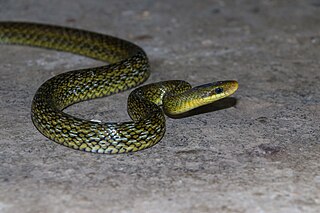
Ahaetulla prasina is a species of snake in the family Colubridae to southern Asia. Its common names include Asian vine snake, Boie's whip snake, Gunther's whip snake, Oriental whip snake,.

Amphiesma monticola, also known as the Wynad keelback, is a harmless colubrid snake species endemic to the Western Ghats of India, where it has been recorded in the Kodagu and Wayanad regions.

The Himalayan keelback is a species of grass snake in the family Colubridae. The species is endemic to South Asia.

Platyceps gracilis, commonly known as the graceful racer or slender racer, is a species of snake endemic to India.

The white-banded wolf snake, also known as the northern large-toothed snake, is a species of colubrid snake found in Asia.

Gonyosoma prasinum is a species of colubrid snake found in Asia.

Elaphe hodgsoni, the Hodgson's rat snake, is a species of snake in the family Colubridae. The species is found in parts of Asia around the Himalayas.

Ptyas korros, commonly known as the Chinese rat snake or Indo-Chinese rat snake, is a species of colubrid snake endemic to Southeast Asia.

Ptyas mucosa, commonly known as the Oriental rat snake, or Indian rat snake, is a common non-venomous species of colubrid snake found in parts of South and Southeast Asia. Dhamans are large snakes. Typical mature total length is around 1.5 to 1.95 m though some exceed 2 m. The record length for this species was 3.7 m, second only to their cousin Ptyas carinata among living colubrid snakes. Despite their large size, oriental ratsnakes are usually quite slender with even a specimen of 2 m commonly measuring 4 to 6 cm only around in diameter. Furthermore, the average weight of ratsnakes caught in Java was around 877 to 940 g, though larger males of over 2.3 m may easily weigh over 2.5 kg (5.5 lb). Their color varies from pale browns in dry regions to nearly black in moist forest areas. Rat snakes are diurnal, semi-arboreal, non-venomous, and fast-moving. Rat snakes eat a variety of prey and are frequently found in urban areas where rodents thrive.

The checkered keelback, also known commonly as the Asiatic water snake, is a common species in the subfamily Natricinae of the family Colubridae. The species is endemic to Asia. It is non-venomous.

Sibynophis collaris, commonly known as the common many-toothed snake,Betty's many toothed snake or the collared black-headed snake, is a species of colubrid snake endemic to South and East Asia.
Rhinophis oxyrhynchus, also known as Schneider's earth snake or Schneider's shieldtail, is a species of uropeltid snake endemic to Sri Lanka.
The purple-red earth snake is a species of nonvenomous shield tail snake, endemic to southern India. No subspecies are currently recognized.

Uropeltis pulneyensis, commonly known as the Indian earth snake and the Palni shieldtail, is a species of snake in the family Uropeltidae. The species is endemic to the Western Ghats of India.

Ophisops jerdonii, commonly known as Jerdon's cabrita, Jerdon's snake-eye, or Punjab snake-eyed lacerta, is a species of lacertid lizard, which is distributed in east Afghanistan, Pakistan, and India.

Ophisops leschenaultii, commonly called Leschenault's snake-eye, Leschenault’s lacerta, or Leschenault's cabrita, is a species of lacertid lizard endemic to India and eastern Sri Lanka. In Sri Lanka, this lizard is called Pandura katussa in Sinhala. In some parts of the country, it is also called Heeraluwa or sikanala, which is more common name for all skink-like reptiles.
Ophiomorus tridactylus, commonly known as the three-toed snake skink, is a species of skink endemic to sandy desert areas of South Asia. It is also called the Indian sand-swimmer for its habit of moving just under the sand.
Hydrophis viperinus, commonly known as the viperine sea snake, is a species of venomous sea snake in the family Elapidae (Hydrophiinae).

Macrelaps is a monotypic genus created for the rear-fanged (opisthoglyphous) venomous snake species, M. microlepidotus, endemic to South Africa. No subspecies are currently recognised.

Aparallactus modestus, or the western forest centipede-eater, is a species of mildly venomous rear-fanged snake in the Atractaspididae family.

















